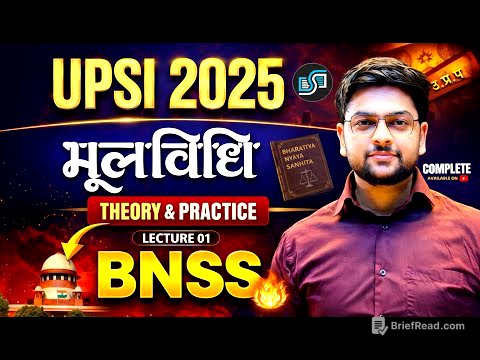TLDR;
This video provides a four-step framework for improving communication skills, suitable for both beginners and experts. It emphasises the importance of self-awareness through recording and reviewing your own speech, identifying areas for improvement, and creating a 30-day plan for practice. The video encourages viewers to break the cycle of constant content consumption and actively apply the techniques discussed to master their communication skills.
- Record yourself speaking to identify areas for improvement.
- Review your recordings focusing on auditory, visual, and transcription aspects.
- Create a 30-day plan to focus on specific improvements each week.
- Practice your communication skills in everyday situations.
Intro [0:00]
Vinh Giang introduces a four-step framework for improving communication skills, which he has used to coach millions of people, from students to CEOs. He offers a free 18-page workbook to help viewers design a 30-day plan to put these steps into action. He argues that everyone already knows what makes a good communicator, as they subconsciously recognise engaging behaviours when watching others, but they need to apply this awareness to themselves.
Step 1 [1:05]
The first step involves recording a 5-minute video of yourself speaking impromptu, without any planning. You should answer one or more of the following questions: state your name and why you're recording the video, describe your hobbies, talk about your best friend and why they are, discuss your favourite food and why, or share what superpower you would choose and why. It's crucial not to stop and restart the video in pursuit of perfection; instead, embrace your imperfections. After recording, don't watch the video immediately, wait at least 24 hours to be less self-critical.
BONUS Step [2:39]
As a bonus step, write down five words you want people to use to describe you after interacting with you. This will guide you during the improvement process. For example, Vinh hopes people see him as charismatic, sincere, fun, playful, confident, and credible.
Step 2 [3:43]
In the second step, review the video you recorded in three different ways using your phone. First, perform an auditory review by playing the video with the sound on but turning the phone away so you can't see the screen. Take notes on what you like, what you want to improve, and whether you radiated the five qualities you chose earlier. Second, do a visual review by muting the sound and watching the video, again noting what you like and what you want to improve in terms of body language, and whether you visually communicate your chosen values.
Step 3 [5:16]
The third step involves getting the video transcribed, which can easily be done by uploading it to YouTube as an unlisted video. Review the transcript to analyse how you structure your thoughts and identify non-words (like "um" and "uh") and filler words (like "so" and "you know"). These non-words and filler words undermine your credibility, authority, and clarity. Take notes on what you like and what you can improve, and start eliminating these non-functional sounds and words from your speech.
Step 4 [6:46]
Vinh explains that much of our communication is unconscious, learned from our parents and early inspirations through imitation. This process of self-review is powerful because it forces you to re-evaluate behaviours you've repeated for years, allowing you to make new decisions and develop new, more effective communication habits.
How to Create the 30 Day Game Plan [8:55]
After gathering insights from the previous steps, create a four-week plan. Download the free workbook provided and pick four things you want to work on, one per week, based on your auditory and visual reviews. At the end of each day, check if you practiced the new behaviour and mark it on your plan.
How to practice (even by yourself) [9:48]
Vinh addresses the common excuse that people don't have opportunities to practice their communication skills. He argues that any time you open your mouth, you have an opportunity to practice, even when you're alone. He urges viewers to stop avoiding practice and application, and to break the cycle of constant content consumption. Mastering communication skills allows you to negotiate any reality you desire.
![30 Day Plan to Master Your Communication [Complete Beginner’s Guide] + FREE Workbook PDF](https://wm-img.halpindev.com/p-briefread_c-10_b-10/urlb/aHR0cDovL2ltZy55b3V0dWJlLmNvbS92aS9VNDBxdlVpZWZRby9tYXhyZXNkZWZhdWx0LmpwZw==.jpg)



![This Crypto Crash Will NOT End Here! [Here's Why]](https://wm-img.halpindev.com/p-briefread_c-10_b-10/urlb/aHR0cDovL2ltZy55b3V0dWJlLmNvbS92aS9EbUdyNzlUemp4TS9ocWRlZmF1bHQuanBn.jpg)




